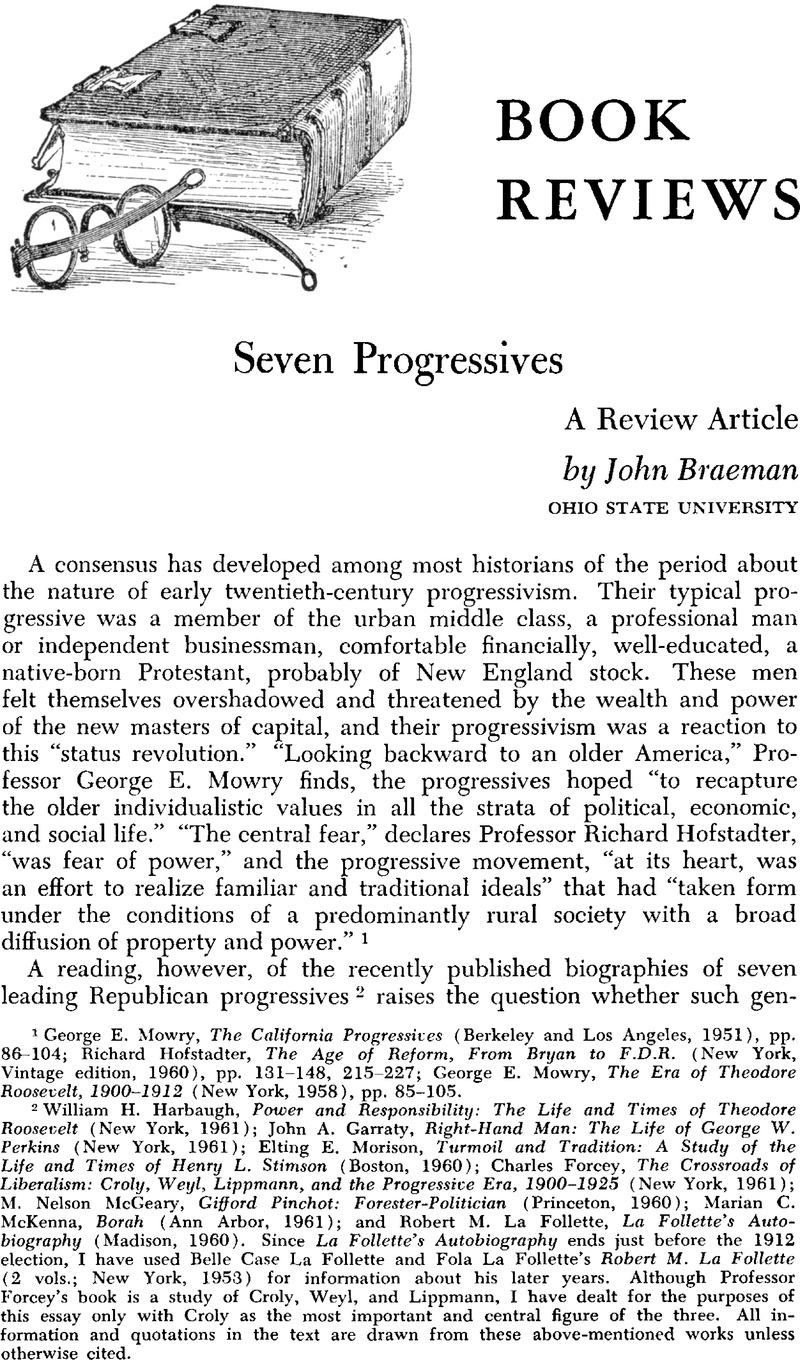Article contents
Seven Progressives–A Review Article
Published online by Cambridge University Press: 24 July 2012
Abstract

- Type
- Review Article
- Information
- Copyright
- Copyright © The President and Fellows of Harvard College 1961
References
1 Mowry, George E., The California Progressives (Berkeley and Los Angeles, 1951), pp. 86–104Google Scholar; Hofstadter, Richard, The Age of Reform, From Bryan to F.D.R. (New York, Vintage edition, 1960), pp. 131–148, 215–227Google Scholar; Mowry, George E., The Era of Theodore Roosevelt, 1900–1912 (New York, 1958), pp. 85–105Google Scholar.
2 Harbaugh, William H., Power and Responsibility: The Life and Times of Theodore Roosevelt (New York, 1961)Google Scholar; Garraty, John A., Right-Hand Man: The Life of George W. Perkins (New York, 1961)Google Scholar; Morison, Elting E., Turmoil and Tradition: A Study of the Life and Times of Henry L. Stimson (Boston, 1960)Google Scholar; Forcey, Charles, The Crossroads of Liberalism: Croly, Weyl, Lippmann, and the Progressive Era, 1900–1925 (New York, 1961)Google Scholar; McGeary, M. Nelson, Cifford Pinchot: Forester-Politician (Princeton, 1960)Google Scholar; McKenna, Marian C., Borah (Ann Arbor, 1961)CrossRefGoogle Scholar; and Follette, Robert M. La, La Follette's Autobiography (Madison, 1960)Google Scholar. Since La Follette's Autobiography ends just before the 1912 election, I have used Belle Case La Follette and Follette's, Fola LaRobert M. La Follette (2 vols.; New York, 1953Google Scholar) for information about his later years. Although Professor Forcey's book is a study of Croly, Weyl, and Lippmann, I have dealt for the purposes of this essay only with Croly as the most important and central figure of the three. All information and quotations in the text are drawn from these above-mentioned works unless otherwise cited.
3 Quoted in Mowry, The Era of Theodore Roosevelt, p. 55.
4 Leuchtenberg, William E., “Progressivism and Imperialism: The Progressive Movement and American Foreign Policy, 1898–1916,” Mississippi Valley Historical Review, vol. XXXIX (Dec, 1952), pp. 483–504CrossRefGoogle Scholar, is a valuable pioneering attempt to link up the domestic and foreign aspects of progressivism, but the approach differs from that taken in the present essay.
5 Hays, Samuel P., Conservation and the Gospel of Efficiency: The Progressive Conservation Movement, 1890–1920 (Cambridge, 1959), especially pp. 261–276Google Scholar.
6 This aspect of the conservation movement is emphasized in Bates, J. Leonard, “Fulfilling American Democracy: The Conservation Movement, 1907–1921,” Mississippi Valley Historical Review, vol. XLIV (June, 1957), pp. 29–57CrossRefGoogle Scholar.
7 Braeman, John, “Albert J. Beveridge and the New Nationalism” (Ph.D. Thesis, Johns Hopkins University, 1960)Google Scholar.
8 MacKay, Kenneth C., The Progressive Movement of 1924 (New York, 1947), p. 11Google Scholar.
9 Link, Arthur S., Woodrow Wilson and the Progressive Era, 1910–1917 (New York, 1954), pp. 66–80Google Scholar.
10 Valuable for tracing La Follette's shift from imperialism to anti-imperialism is Kennedy, Padriac C., “La Follette's Imperialist Flirtation,” Pacific Historical Review, vol. XXIX (May, 1960), pp. 131–144CrossRefGoogle Scholar.
11 Doan, Edward N., The La Follettes and the Wisconsin Idea (New York and Toronto, 1947), pp. 143–297Google Scholar.
- 2
- Cited by




